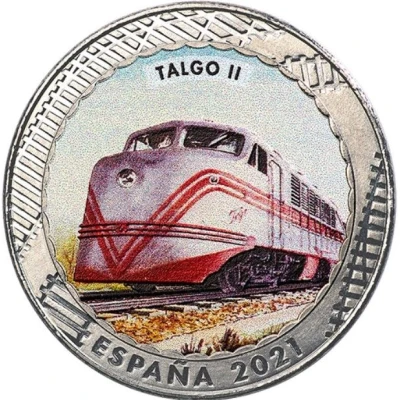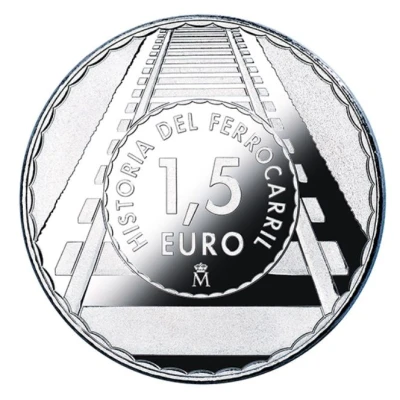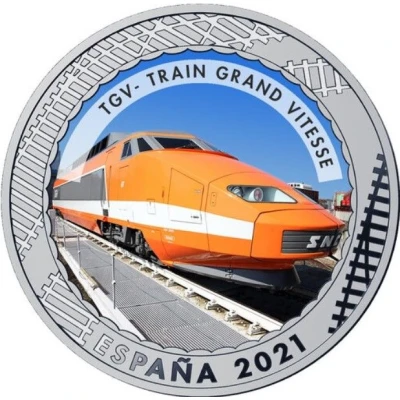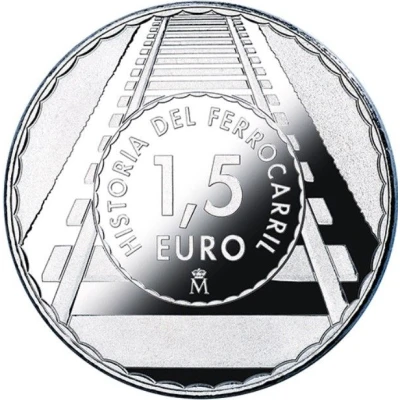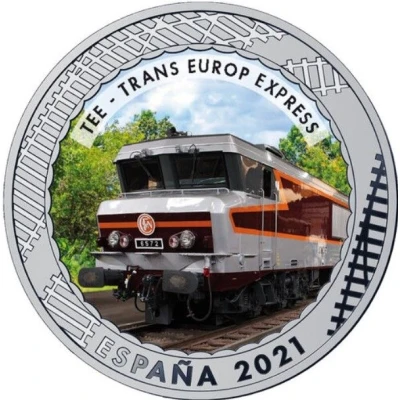
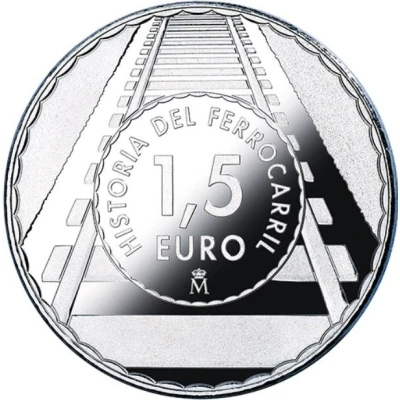

© Real Casa de la Moneda
1.5 Euro TEE - Trans Europ Express
2021 year| Copper-nickel (75% copper, 25% nickel) | 15 g | 33 mm |
| Issuer | Spain |
|---|---|
| King | Felipe VI (2014-date) |
| Type | Non-circulating coin |
| Year | 2021 |
| Value | 1.5 Euro 1.50 EUR = USD 1.65 |
| Currency | Euro (2002-date) |
| Composition | Copper-nickel (75% copper, 25% nickel) |
| Weight | 15 g |
| Diameter | 33 mm |
| Shape | Round |
| Technique | Milled, Coloured |
| Orientation | Medal alignment ↑↑ |
| Updated | 2024-10-07 |
| Numista | N#320113 |
|---|---|
| Rarity index | 92% |
Reverse
Series and face value inside a central circle. Outside the central circle, an image of a railway track.
Script: Latin
Lettering:
HISTORIA DEL FERROCARRIL
1,5 EURO
M
Translation: History of railways
Edge
Plain
Comment
For the year 2021, since the European Year of the Rail and the 80th Anniversary of Renfe are celebrated, the FNMT-RCM issues a collection of 20 coins dedicated to the History of the Railways. This series reproduces a selection of trains and locomotives that have been relevant throughout its history.TEE – TRANS EUROP EXPRESS: After the Second World War, the transport market started to undergo rapid change as commercial aviation gained ground. This, combined with the establishment of a common European economic space, led to a considerable rise in demand for international mobility. While this was going on, rail travel remained weighed down by hefty Customs charges and the inevitable changeover of convoys.
It was in this setting that forward-thinking Dutchman F.Q. den Hollander came up with the Trans Europ Express (TEE) in the 1950s. The idea consisted in the provision of a European luxury express service which, in addition to improving the quality of supply, would overcome those stumbling blocks.
The TEE network was presented in1957 by Holland and Switzerland, to be joined not long afterwards by Germany, France, Belgium and Italy. Initially, the trains consisted of a diesel locomotive and three first-class carriages fitted with the novel features of air conditioning to maintain an ideal temperature and double glazing to reduce noise. Being luxury trains, there was more room for the passenger and each seat had a side table for meals or working on.
Although a number of common characteristics was established so as to make the trains easily recognisable, such as the initials TEE engraved in metal on a red background, each country chose its own arrangement. Particularly noteworthy was the French train, the Aquitaine, which covered the route between Paris-Austerlitz and Bordeaux-Saint-Jean from 1971 to 1984. With an average speed of 145 km/h and a top speed of 220 km/h, it ranked as the fastest train in Europe. As it was designed for business passengers, it did not run on Saturdays. As time went by, more stops were included on the route. In 1984, the Aquitaine lost its TEE status and was withdrawn in 1990 when the SNCF put a TGV into circulation to cover the Paris-Bordeaux route.
Interesting fact
The Trans Europ Express (TEE) coin, released in 2021 by Spain, features a unique design that showcases a high-speed train, symbolizing the connection between Europe and Spain. The coin's design also includes the words "Trans Europ Express" and "1.5 Euro" in bold letters, making it easily recognizable. Additionally, the coin's copper-nickel composition gives it a distinctive color and durability, ensuring that it will remain a valuable collector's item for years to come.
Price
| Date | Mintage | VG | F | VF | XF | AU | UNC |
|---|---|---|---|---|---|---|---|
| 2021 M | 7000 | - | - | - | - | - | - |
Values in the table are based on evaluations by sales realized on Internet platforms. They serve as an indication only for 1.5 Euro (TEE - Trans Europ Express) 2021 coin.
